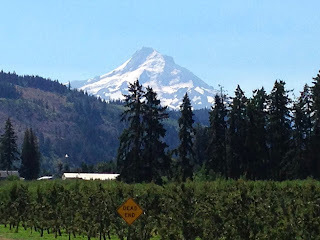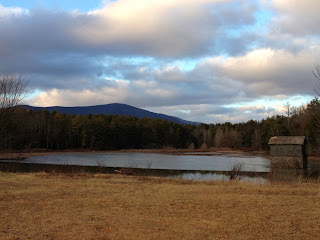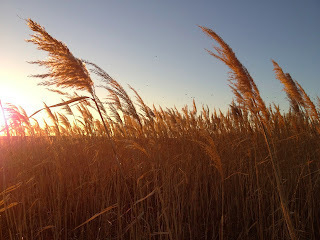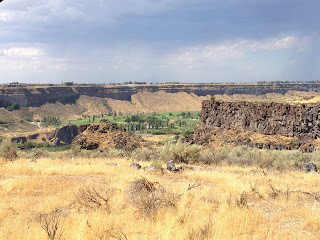Prophecy
∞
The Moral Issue Of Land
In my daily readings a while back I came upon this:
And this, written by Alan Paton. His younger Jarvis (in Cry, the Beloved Country) also writes prophetically about South Africa. What he says could have been written about any number of places, though:
The question I am pondering this morning: What do love and justice require of us when it comes to land ownership?
This question is made more poignant as our state legislature is considering eliminating perpetual conservation land easements. One argument against them is that it seems unreasonable to put limitations on future people. We may rightly ask: can we consider those people who do not yet exist - and who therefore may never exist - as factors or agents in our moral reasoning?
And yet every time we consume a non-renewable resource we are making an irrevocable decision about what the land will yield for perpetuity. Land easements may be one way to offset the effects of our other decisions, and they are at least reversible if the future proves them foolish.
Jarvis correctly diagnoses us: when we think about the future, frequently we are moved by fear. Isn't that why the prince Ezekiel spoke of was tempted not to give up his land?
I also find that when I think about the future, I am also motivated by love, and that love is perhaps my strongest, my most angelic impulse. I save, teach, build, conserve, and create for my children, and for others like them. I may not be able to give them a better world, but I do feel - I admit it is, at its base, a feeling - that I owe them at least as good a world as I received.
"[The prince] is to give his sons their inheritance out of his own property so that none of my people will be separated from his property." (Ezekiel 46.18)
 |
| Central Oregon |
And this, written by Alan Paton. His younger Jarvis (in Cry, the Beloved Country) also writes prophetically about South Africa. What he says could have been written about any number of places, though:
"It is true that we hoped to preserve the tribal system by a policy of segregation. That was permissible. But we never did it thoroughly or honestly. We set aside one-tenth of the land for four-fifths of the people. Thus we made it inevitable, and some say we did it knowingly, that labour would come to the towns. We are caught in the toils of our own selfishness....No one wishes to make its solution seem easy....But whether we be fearful or no, we shall never, because we are a Christian people, evade the moral issues."As a child I thought prophets were people who predicted the future, or who spoke things God wanted to say, like spokespeople. As I've grown older, my notion of prophets has expanded to mean those people who disrupt our quotidian secular and economic concerns in order to remind us that love and justice may and must constrain our actions. What could be more important than that?
 |
| Zena Reservoir and Overlook Mountain |
The question I am pondering this morning: What do love and justice require of us when it comes to land ownership?
This question is made more poignant as our state legislature is considering eliminating perpetual conservation land easements. One argument against them is that it seems unreasonable to put limitations on future people. We may rightly ask: can we consider those people who do not yet exist - and who therefore may never exist - as factors or agents in our moral reasoning?
 |
| Dakota prairie |
And yet every time we consume a non-renewable resource we are making an irrevocable decision about what the land will yield for perpetuity. Land easements may be one way to offset the effects of our other decisions, and they are at least reversible if the future proves them foolish.
Jarvis correctly diagnoses us: when we think about the future, frequently we are moved by fear. Isn't that why the prince Ezekiel spoke of was tempted not to give up his land?
I also find that when I think about the future, I am also motivated by love, and that love is perhaps my strongest, my most angelic impulse. I save, teach, build, conserve, and create for my children, and for others like them. I may not be able to give them a better world, but I do feel - I admit it is, at its base, a feeling - that I owe them at least as good a world as I received.
 |
| Twin Falls, Idaho |
∞
Is It Time For A New Transcendentalism?
For the last few weeks I have found
myself returning to this question: Is it
time for a new Transcendentalism?
I normally try to write simple blog posts, but this one might get a little technical. I'll try to minimize the jargon (and so, no doubt, will do some injustice to the technical stuff) but feel free to skip the following section if you like.
The Seeds Of Transcendentalism
When we teach Transcendentalism, we emphasize a few key texts by figures like Emerson, Thoreau, Fuller, Carlyle, Coleridge, Hedge, and others of their acquaintance. Attention to nature, and terms like "self-reliance" and "civil disobedience" shape our understanding of the movement, though they are more like the fruit of the movement than its seeds.
One of the most important seeds of Transcendentalism is the refusal to let one's self be owned, defined, or constrained by others. Today, "self-reliance" sounds like a description of someone who owns a generator in case the power goes out, or who learns engine repair so she doesn't need to depend on a mechanic. But closer to the heart of Transcendentalism is suspicion of others' descriptions of the self and the world.
Inspired in part by Kant's phenomenology and in part by German and English Romanticism, Emerson charted a course between the stifling atmosphere of inherited religion and the determinism of mechanistic philosophies. Unable to find a reliable source of knowledge in the experienced world (our perceptions are always a little off, and maybe they're completely mistaken, as when we hallucinate) Kant located another source of knowledge in our innate ability to know the world at all. Kant argued that we have innate structures of knowledge, intuitive forms that transcend all experience and so are not subject to the doubt directed at experience. Emerson Platonized Kant's epistemology, taking Kant to mean that our inward reflections not only form the world, but give us direct access to the meaning of the world. The individual knower knows some things without being taught them by anyone else.
To put that in other terms, Emerson's Transcendentalism emphasized an "original relation to the universe," in which we trust our intuitions and exercise distrust towards beliefs that have come from outside us. This calls for "prospective," not retrospective, thinking, meaning a willingness to look forward to new possibilities rather than looking backwards to the rules and traditions of our ancestors to acquire rules for our lives.
In even simpler terms, when we let churches and other institutions (scientific, economic, cultural, etc) limit our self-understanding, we also allow them to constrain the scope of our possibilities.
A New Transcendentalism
It may seem we no longer need Transcendentalism because churches are losing their authority and many of us feel free to think what we wish. I am skeptical of this latter claim. Peirce argues that we do not seek the truth; we seek relief from the irritation of doubt. We look for beliefs that are comfortable, and the most comfortable beliefs are the ones that mesh well with the beliefs of others around us. C.S. Lewis, in his preface to Athanasius' De Incarnatione, argues that we should read old books because that is one of the surest ways to have our current beliefs challenged. He adds that simply reading broadly in modern books will not do because people who live in any given age tend to share most of their beliefs. Training in history, and especially in the history of ideas, exposes our beliefs to a broader community that can cast doubt on what we believe.
Another way of saying this is that we agree with ideas that bear the imprimatur of our community. One idea that has growing acceptance is the idea that to be human is to be describable. I admit I am fascinated by this idea, and I delight in learning about the molecules that make our bodies, and the ways they interact.
But I find myself resisting this description of life. Not because it seems wrong, but only because it seems incomplete. It is tempting to turn a good description into a complete one, to be satisfied with a partial description precisely because there is no pressure not to accept it.
Isn't this one of the things we mock in earlier ages, though? I mean their unblinking acceptance of what everyone else around them believed. Are we so free of that same tendency in our own age?
Doubt As A Gardener
Let me add at this point that I find myself thinking about this in my quietest times of reflection, which makes me think it's not coming to me as a polemic against something so much as an apology for something. I don't want to argue against science, because I think science is one of the finest things we've ever come up with. What I want is something that will nevertheless act as a loyal opposition to science, a court jester, perhaps, who will listen patiently to court business about the latest discoveries, but then impudently ask "Yes, but why do you care?" Or say "That's really beautiful, isn't it? Now - tell me about beauty in a way that doesn't leave anything out."
It won't be easy. Transcendentalists and jesters aren't often taken seriously, but their work is perhaps the most serious and important type of work. What I am calling for is like what Cornel West calls prophecy, a missional work of justice, a forward-looking, love-driven endeavor that doesn't want to see anyone taken prisoner by a merely adequate account of what it means to be human. I don't have a full vision of what this means; I'm writing about it here as a first step of externalizing a hunch that it's time to reclaim something of Emerson's vision and to plant the seeds of some doubt.
Doubt is not the enemy of faith and knowledge; it is the gardener who prunes the plant so that it may flourish.
I normally try to write simple blog posts, but this one might get a little technical. I'll try to minimize the jargon (and so, no doubt, will do some injustice to the technical stuff) but feel free to skip the following section if you like.
The Seeds Of Transcendentalism
When we teach Transcendentalism, we emphasize a few key texts by figures like Emerson, Thoreau, Fuller, Carlyle, Coleridge, Hedge, and others of their acquaintance. Attention to nature, and terms like "self-reliance" and "civil disobedience" shape our understanding of the movement, though they are more like the fruit of the movement than its seeds.
One of the most important seeds of Transcendentalism is the refusal to let one's self be owned, defined, or constrained by others. Today, "self-reliance" sounds like a description of someone who owns a generator in case the power goes out, or who learns engine repair so she doesn't need to depend on a mechanic. But closer to the heart of Transcendentalism is suspicion of others' descriptions of the self and the world.
Inspired in part by Kant's phenomenology and in part by German and English Romanticism, Emerson charted a course between the stifling atmosphere of inherited religion and the determinism of mechanistic philosophies. Unable to find a reliable source of knowledge in the experienced world (our perceptions are always a little off, and maybe they're completely mistaken, as when we hallucinate) Kant located another source of knowledge in our innate ability to know the world at all. Kant argued that we have innate structures of knowledge, intuitive forms that transcend all experience and so are not subject to the doubt directed at experience. Emerson Platonized Kant's epistemology, taking Kant to mean that our inward reflections not only form the world, but give us direct access to the meaning of the world. The individual knower knows some things without being taught them by anyone else.
To put that in other terms, Emerson's Transcendentalism emphasized an "original relation to the universe," in which we trust our intuitions and exercise distrust towards beliefs that have come from outside us. This calls for "prospective," not retrospective, thinking, meaning a willingness to look forward to new possibilities rather than looking backwards to the rules and traditions of our ancestors to acquire rules for our lives.
In even simpler terms, when we let churches and other institutions (scientific, economic, cultural, etc) limit our self-understanding, we also allow them to constrain the scope of our possibilities.
A New Transcendentalism
It may seem we no longer need Transcendentalism because churches are losing their authority and many of us feel free to think what we wish. I am skeptical of this latter claim. Peirce argues that we do not seek the truth; we seek relief from the irritation of doubt. We look for beliefs that are comfortable, and the most comfortable beliefs are the ones that mesh well with the beliefs of others around us. C.S. Lewis, in his preface to Athanasius' De Incarnatione, argues that we should read old books because that is one of the surest ways to have our current beliefs challenged. He adds that simply reading broadly in modern books will not do because people who live in any given age tend to share most of their beliefs. Training in history, and especially in the history of ideas, exposes our beliefs to a broader community that can cast doubt on what we believe.
Another way of saying this is that we agree with ideas that bear the imprimatur of our community. One idea that has growing acceptance is the idea that to be human is to be describable. I admit I am fascinated by this idea, and I delight in learning about the molecules that make our bodies, and the ways they interact.
But I find myself resisting this description of life. Not because it seems wrong, but only because it seems incomplete. It is tempting to turn a good description into a complete one, to be satisfied with a partial description precisely because there is no pressure not to accept it.
Isn't this one of the things we mock in earlier ages, though? I mean their unblinking acceptance of what everyone else around them believed. Are we so free of that same tendency in our own age?
Doubt As A Gardener
Let me add at this point that I find myself thinking about this in my quietest times of reflection, which makes me think it's not coming to me as a polemic against something so much as an apology for something. I don't want to argue against science, because I think science is one of the finest things we've ever come up with. What I want is something that will nevertheless act as a loyal opposition to science, a court jester, perhaps, who will listen patiently to court business about the latest discoveries, but then impudently ask "Yes, but why do you care?" Or say "That's really beautiful, isn't it? Now - tell me about beauty in a way that doesn't leave anything out."
It won't be easy. Transcendentalists and jesters aren't often taken seriously, but their work is perhaps the most serious and important type of work. What I am calling for is like what Cornel West calls prophecy, a missional work of justice, a forward-looking, love-driven endeavor that doesn't want to see anyone taken prisoner by a merely adequate account of what it means to be human. I don't have a full vision of what this means; I'm writing about it here as a first step of externalizing a hunch that it's time to reclaim something of Emerson's vision and to plant the seeds of some doubt.
Doubt is not the enemy of faith and knowledge; it is the gardener who prunes the plant so that it may flourish.